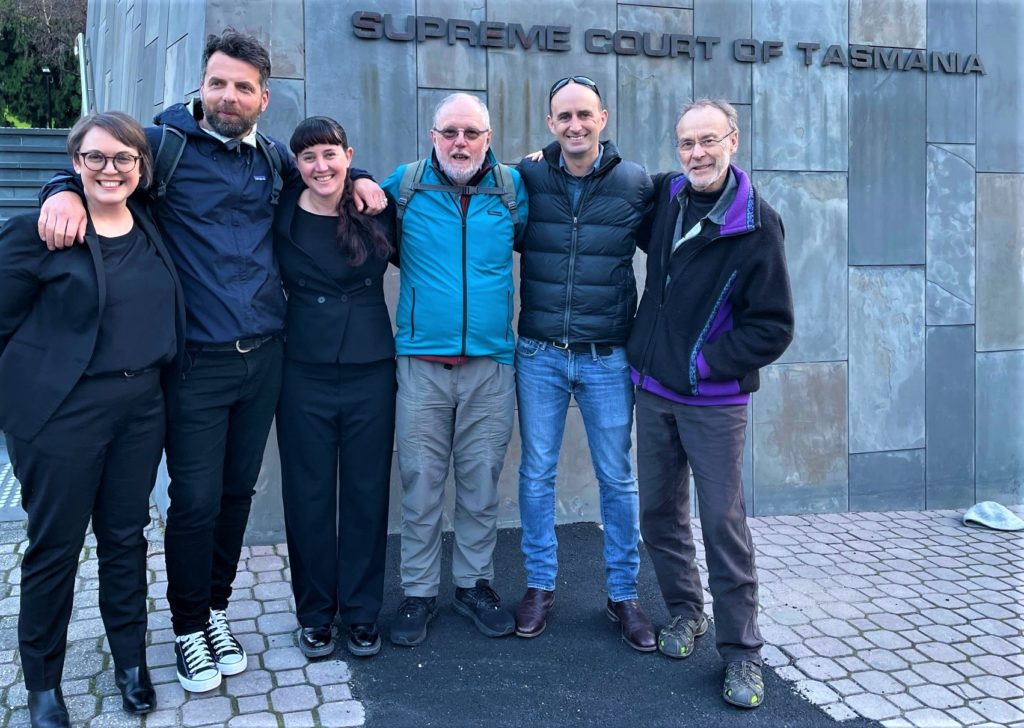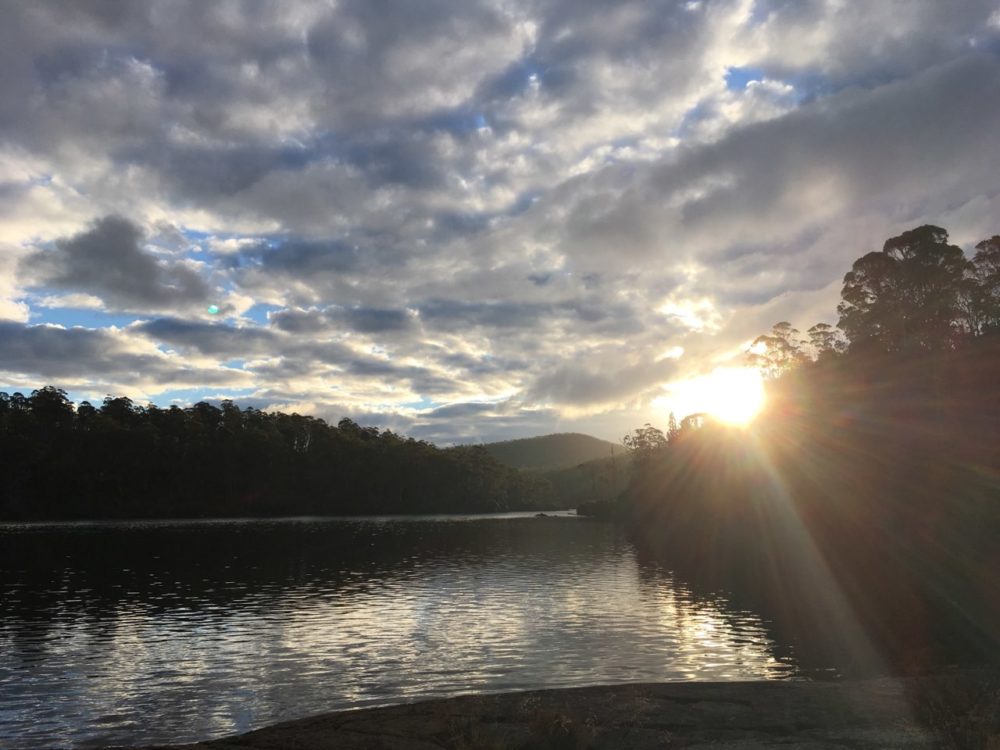A planning appeal relating to a heli-tourism development at Halls Island, Lake Malbena, in the Tasmanian Wilderness World Heritage Area (TWWHA) has been withdrawn, in a huge win for EDO clients the Wilderness Society (Tasmania), Tasmanian National Parks Association, Richard Webb and Paul Smith.
Tourism company Wild Drake Pty Ltd proposed to exclusively use and develop Halls Island for luxury accommodation, with guests accessing the site in up to 240 helicopter flights a year.
The proposal was originally refused by the Central Highlands Council in 2019, with Wild Drake appealing that decision to the Resource Management and Planning Appeal Tribunal.
Our clients joined the appeal to defend the council decision to refuse planning permission in early 2019, with the Tribunal granting a permit in December 2019. The Tribunal found it was required to grant a permit on a legal basis and it did not consider the merits of the proposal.
Our clients then appealed the Tribunal decision to the Tasmanian Supreme Court and then to the Full Court of the Supreme Court, where they succeeded in setting aside the decision to grant permit and having the appeal remitted to the Tribunal for a fresh decision.
On 15 December 2021,, Wild Drake withdrew its planning appeal before the Tribunal, bringing to end a lengthy legal process.
EDO Managing Lawyer Claire Bookless said:
“We are delighted that after almost three years of legal battle this unspoiled and unique part of the Tasmanian Wilderness World Heritage Area remains undeveloped.
“This was always a totally inappropriate development proposal that would have turned a World Heritage site over to a private developer at the expense of the environment and contrary to the community’s wishes.
“In the original Tribunal hearing, our clients presented compelling expert evidence on the significance of this site and the threat this project posed to the Wilderness World Heritage values. The withdrawal of the appeal vindicates our clients defending these proceedings and their commitment to the protection of our precious World Heritage Area.
“This is a win for everyone in the Tasmanian community who understands the value of our unspoilt World Heritage Area.
“However, it’s extremely disappointing that our clients have had to fight so many legal battles to protect this internationally recognised area from inappropriate development.
“This case emphasises the importance of Tasmania maintaining third party appeal rights for tourism and other developments in our World Heritage Area, parks and reserves in upcoming reforms to both our planning system and national parks legislation. ”

A long legal battle
Halls Island, Lake Malbena, is within the Walls of Jerusalem National Park. The area, known for its wild rivers, remoteness, biodiversity, scenic beauty and cultural values, is popular with bushwalkers and anglers.
The luxury tourism venture proposed by Wild Drake Pty Ltd involved:
- an accommodation complex comprising three accommodation buildings, central kitchen/communal hut and associated toilet facilities;
- board-walking on Halls Island;
- a helicopter landing site near the shore of Lake Malbena opposite Halls Island; and
- up to 240 one-way helicopter flights between Derwent Bridge and Lake Malbena to provide guest access, with additional flights for maintenance and construction.
The Halls Island development planning permit was initially refused by the local council, and proponent lodged an appeal to the Resource Management and Planning Appeal Tribunal in March 2019.
EDO clients joined the appeal to argue that the council’s refusal of a permit should be upheld. After an intensive seven days of hearing in July and August 2019, where EDO clients presented compelling expert evidence on the wilderness values of the site, compliance with the reserve management plan and the impact of the proposal, the Tribunal decided in December 2019. that a permit should be granted to the proposal. This decision was made on the basis of the Tribunal’s interpretation of the planning scheme and did not consider the merits of the proposal itself or the evidence led.
In January 2020, EDO’s clients appealed the Tribunal’s decision to the Tasmanian Supreme Court. On 6 July 2020, the Tasmanian Supreme Court upheld the Tribunal’s decision to grant a planning permit.
That decision was appealed by EDO’s clients, with a hearing in the Full Court of the Supreme Court in October 2020. In September 2021, the Full Court of the Tasmanian Supreme Court overturned the Resource Management and Planning Appeal Tribunal decision and ordered that it reconsider its decision.
Wild Drake’s decision to withdraw its planning appeal on 15 December 2021 brings an end to that legal process, and to the development application made by Wild Drake for the proposal.
However, the project is still before the Federal Environment Minister for assessment of its environmental impacts following a successful legal challenge by EDO in the Federal Court in 2019. That process is still ongoing. The development cannot proceed without a planning permit, and a new application would need to be made to the local council.
Impact on future developments
The Full Court of the Supreme Court decision clarified how developments and uses within Tasmanian national parks and reserves are to be assessed under planning laws in Tasmania.
If no appeal had been made to the Full Court, the Tribunal’s October 2019 ruling and December 2019 decision would have meant that planning authorities could not undertake their own assessment of whether private development in national parks complies with the applicable reserve management plan. This would have meant that the impacts of proposals on the in our parks and reserves would generally only be assessed by the Parks and Wildlife Service (PWS) under its non-statutory Reserve Activity Assessment (RAA) process, which does not guarantee public participation and has no merits appeal rights.
This is important because the Lake Malbena proposal is one of the projects selected through the Tasmanian government’s Expressions of Interest process for developing national parks and reserves, and one of the first projects to be approved by the PWS under the RAA process. There are many more projects currently being assessed through this process.
The successful outcome our client’s 2019 Federal Court challenge is significant because:
- It tells us how the Federal Minister for the Environment should make decisions about whether Environment Protection and Biodiversity Conservation Act 1999 (EPBC Act) approval is required. This is critical for properly regulating development in internationally significant protected places such as World Heritage Areas.
- It makes it clear that the Minister for the Environment must consider whether a project is part of a larger action before he or she can make a decision about whether the project should undergo further assessment under the EPBC Act. This makes it harder for developers to divide their proposals into smaller stages in order to avoid detailed scrutiny under EPBC Act assessments processes.
- The Court has made clear that the Federal Minister for Environment cannot rely on the RAA process in making decisions under the EPBC Act because the RAA process is non-statutory and not binding.
- The Court’s decision provided the opportunity for the Minister to reconsider the proposal for Lake Malbena and require that it undergo a more detailed assessment under Federal law.






